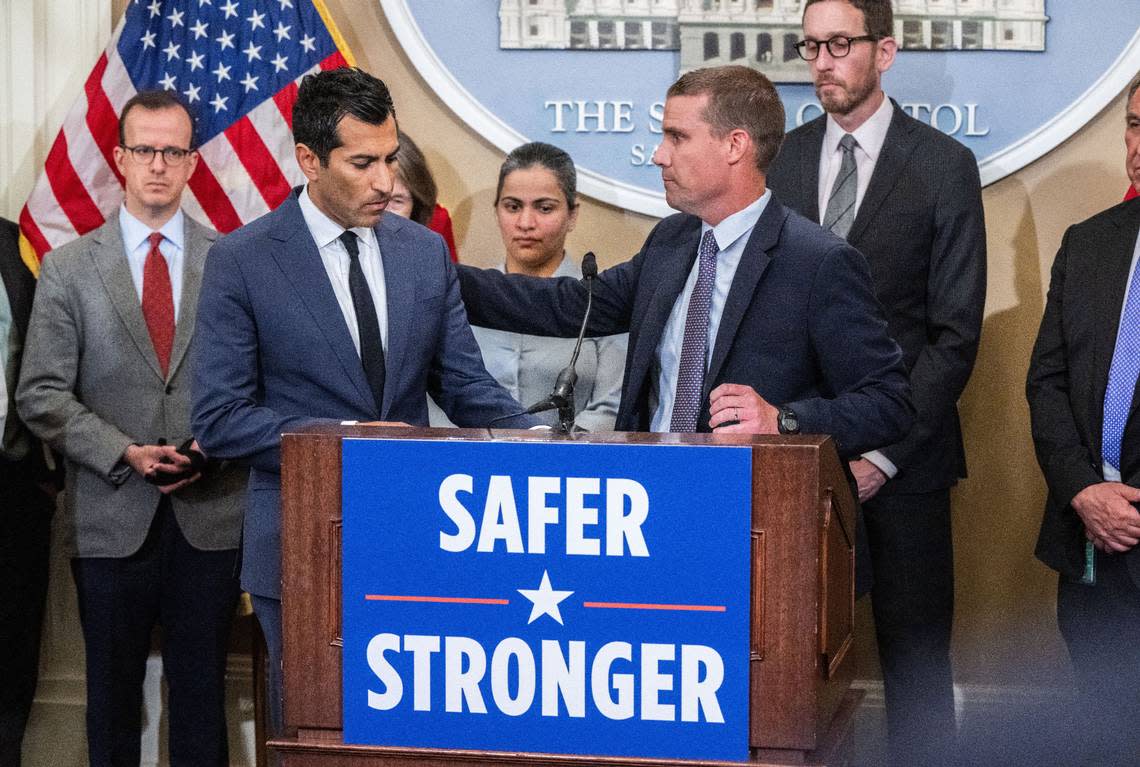California Democrats got dragged into changing Prop. 47 — even though many still oppose it

- Oops!Something went wrong.Please try again later.
California Democratic leaders are spending their last week before summer break pushing a ballot measure changing portions of Proposition 47 — even though a large chunk of their members may not support it.
On Monday, 35 Assembly members voted in favor of a last-minute initiative from Newsom and legislative leaders rolling back portions of the 2014 voter-approved initiative that made certain theft and drug crimes misdemeanors and set a $950 felony threshold for shoplifting. One Democrat voted against the measure.
While 41 votes will ultimately be needed for passage — and usually Democratic leaders get that easily on plans they endorse — 28 legislators, almost all Democrats, did not vote for a variety of reasons. At least six were absent.
The remaining 22 not-voting members included a mix of moderate and progressive Democrats leaders will need to reach the threshold required to officially get the bill off the Assembly floor by Wednesday night.
Even Senate President Pro Tem Mike McGuire, D-Healdsburg, seemed to be supporting the ballot measure only reluctantly. He told the Sacramento Press Club on Monday he would be voting for it, even though “it is unfortunate that we are here.”
“I do not believe that if we’re seriously going after retail theft that we need to amend Prop. 47,” McGuire said. “I think we have the legislative package that’s in front of us right now that will solve for that challenge.”
The vote was the next step in moving Senate Bill 1381 — which lawmakers gutted and amended to include the ballot measure language — through the Capitol.
Last-minute initiative
Gov. Gavin Newsom, McGuire and Assembly Speaker Robert Rivas, D-Hollister, have said repeatedly a district attorney-backed ballot measure to change Proposition 47 would take the state back to the tough-on-crime era of decades past, which they said resulted in mass incarceration of Black and brown Californians.
They created a 14-bill package tightening penalties on retail theft crimes as an alternative and tried to get the California District Attorneys Association to remove their initiative. As part of that effort, Rivas and McGuire changed some of the bills voiding the legislation if the district attorneys’ measure passes.
That served only to split Democrats and anger Republicans who support the district attorneys’ initiative.
With time running out, leaders negotiated their final effort late on Sunday: a dueling ballot measure that’s slightly more narrow than the one they’re fighting.
If the Legislature passes it, voters will consider the initiative in November, alongside the district attorneys’ measure. If Democrats’ version of the initiative gets more votes, the opposing measure will be “null and void.”
Although the two initiatives both change Proposition 47, McGuire said the legislative version is necessary because he’s “worried about the draconian measure that has been advanced by the DAs.”
He highlighted a section that would increase penalties on those charged with shoplifting after previously being convicted of two or more theft-related offenses within three years.
“Petty theft with a prior in the DA’s measure is a lifetime lookback,” McGuire said. “If a kid steals a candy bar and is charged with petty theft with a prior, that could potentially be a future felony because it’s a lifetime lookback. Californians don’t want that.”
Moderate Democrats backed by district attorneys and law enforcement may find it hard to support the Legislature’s opposing initiative.
And lawmakers’ narrower initiative may still be too much for progressives who don’t want to see any increased penalties for theft and drug crimes.
Assemblyman Alex Lee, D-San Jose, who chairs the Legislative Progressive Caucus, said he is “concerned about a generational change to Proposition 47 and our criminal justice political landscape.”
“We have had literally months to defend, socialize and think about the retail theft package,” Lee said. “... Now we’re talking about a generational shift to public safety that we have to process in 72 hours. And from a process standpoint, from a heavy topic standpoint, it is far from ideal to do that.”

